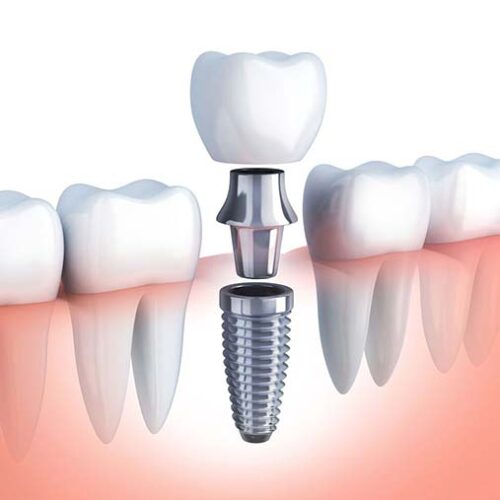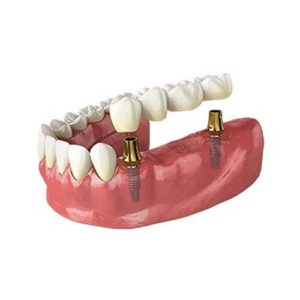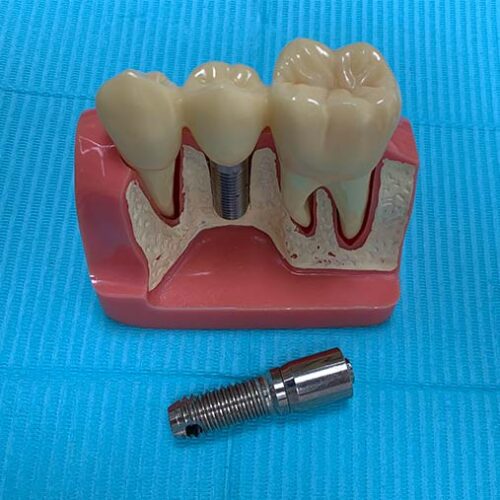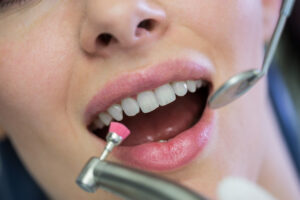Dental Implants
Dental implants look and function just like normal teeth.
What are dental implants?
Dental implants simply replace missing teeth. Different to removable dentures, dental implants look, feel and behave like natural teeth.
By not replacing missing teeth, it can not only affect your appearance and confidence, it is also a gateway to general health problems in the future.

What can dental implants replace?
- Replace a missing single tooth
- Support dental bridges (a number of teeth together)
- Secure entire full mouth dentures, either removable or fixed
What are the health impacts of not replacing missing teeth?
Tooth loss can have a dramatic impact on a person’s life as it can not only affect physical appearance and the self-confidence to smile, but also has negative impacts on well-being and other dental and health issues such as:
- Change in bite due to shifting teeth
- Trouble chewing certain foods vital for nutrition
- Bone loss in the jaw leading to facial disfigurement
- Drifting and movement of remaining teeth
- Extra strain on remaining teeth causing more missing teeth
- Joint problems in the jawbone leading to migraines and jaw pain
What are the benefits of dental implants?
- They look and function just like normal healthy teeth
- Teeth implants will never decay
- Teeth implants prevent side effects that can occur with tooth loss. Namely, receding gum, bone loss, and speech difficulties
- Teeth Implants maintain the strength and well-being of adjacent teeth as bridgework is not required
- They allow you to chew properly again so you can enjoy regular nutritious food.
- Teeth implants make full dentures more securely and function more reliably
- Teeth implants prevent bone loss and preserve the appearance of your facial appearance to prevent ageing.
- Once inserted, the implant is comfortable and looks, feels and behaves like normal teeth.
What are dental implants made from?
Dental implants are bio-compatible titanium replacements of the tooth’s attaching roots. Dental implants are used as substitutes for absent teeth. There are three sections associated with dental implant restorations, including:
- Titanium, bone-integrated implant – inserted in the jawbone
- Implant abutment – placed on top of the implant
- Porcelain crown - positioned on top of the implant abutment to resemble a normal tooth.
Dental implants vs bridges: Which is better?
Implants have noticeable benefits in comparison to traditional bridges as a way to replace missing teeth. Dr Finkelstein has provided a quick explanation in the below video.
- For bridges to be created, strong healthy teeth either side of the missing tooth need to be ground away to support the bridge. This needlessly impacts perfectly functioning teeth, opening up risk of decay and further loss of these supporting teeth.
- The neighbouring healthy teeth are also exposed to biting stress beyond the typical threshold which can again cause them to deteriorate faster.
- The added biting stress also causes the formation of visually displeasing, shady areas surrounding the bridge as the gum and bone start to separate from the supporting teeth.
- The strain on the bridge can also lead to an opening forming between the bridge and the tooth, resulting in bacteria leakage and deterioration, increasing the change of root canals.
- Lastly, bridges created through the linking of 3 or more teeth makes flossing challenging, and sometimes unmanageable.
Who can get dental implants?
Dental implants are a potential option for anyone with missing teeth. People of any age are able to receive dental implants, however it is advisable that children and teens do not receive dental implants, as during these stages their facial structure and dental bones are still developing.
The ideal time for people to get dental implants would be soon after tooth loss or extraction. Dental implants have still been positioned effectively years after to tooth loss. The most important factor is having enough healthy bone in the jaw to support and surround the implant.
Are there any the risks with dental implants?
The placement of dental implants is extremely predictable due to the advancement of the technology over the past 10 years. It is extremely rare that an implant doesn’t take to a person’s mouth. If this does occur, it is simply fixed with the positioning of a new implant.
Your dental implant treatment with Dr Finkelstein
Before deciding on dental implant treatment we will explain everything to you so you understand what is going to happen each step of the way.
Step 1
Planning
A treatment process will be determined in advance. Computer imaging of your teeth will be required to observe the condition of the bone. Computer imaging will also aid with creating three-dimensional footage of your mouth to ensure the appropriate placement of the dental implants.
Step 2
Creating the surgical guide
Once the appropriate imaging has been completed you will return for another appointment to discuss treatment options. If you are satisfied with your treatment plan, our lab will create the surgery guide. The surgery guide allows us to place the implant accurately without needing to make an incision.
Step 3
Implant Placement
The titanium implant will be placed in the perfect position using the surgical guide so that the surrounding gum tissue can cultivate (grow) around your implant.
Step 3
Healing
The bone surrounding the implant will merge naturally with the implant. This process can take 3-6 months however superficial healing will take a couple of weeks.
Step 4
Temporary Restoration or healing abutment
A temporary implant will be placed if the implant is in an area that is noticeable as this is only required for aesthetic reasons during the healing process. If the implant is in the back of the mouth, a healing abutment will be placed to encourage the gum to grow in a desirable position for the final crown.
Step 5
Abutment
Once the healing has finished, an impression of your dental implant and surrounding teeth will be taken in order for our labs to make the crown that will be attached to your omplant.
Step 6
Crown
Our ceramicist will construct a customised porcelain crown using the precise measurements used in the planning. The crown is connected to the abutment to resemble a brand new and healthy-looking tooth.


What limitations are there with dental implants?
In the long-term, there are no limitations for a person with dental implants, however there are a few minor restrictions within the first few weeks whilst the bone is healing. It is vital to steer clear of biting hard food during the first few weeks. After this, hard food can be slowly consumed until eventually your diet will be like normal.
How do I clean and care for my dental implants?
We will show you the correct flossing techniques after we fit your implant crown. It is important to keep your implant clean with the use of Superfloss or Xfloss. These are special types of floss used for cleaning dental implants. It is recommended that you brush and floss twice a day, as you would regularly. Visits to the dentist should also continue. This usually consists of 6 monthly check-ups for monitoring and cleaning.
How much do dental implants cost?
It’s difficult to give an estimate on costs with dental implants as the variety of implant types and styles can vary greatly. Depending on whether you have one tooth, multiple teeth or a whole denture will impact the costs. Also, we use up to four different providers of dental implants offering different styles and quality which also impacts costs. We can provide a full list of cost options relevant to your treatment during your initial consultation.
Payment Options at Dr Finkelstein Dentist

- Visa & Mastercard - We do not charge you merchant fees on credit cards.
- Health Funds - We offer pay-the-gap only when you bring your health fund card along.
- Afterpay - Get treated now, pay later!
Considering dental implants?
Get a professional assessment from Dr. Finkelstein on the right solutions for you to improve your smile.
Please complete the below form to chat with one of our friendly team. Once we receive your message, we will be in touch to answer any questions you have and book you in for an appointment. Alternatively, you can call us on (02) 9262 7778 or use our Online Chat between 8:00am until 5:00pm, Monday to Friday.
Get into the Finkelstein Files

Teeth Whitening 101: Professional vs. At-Home Options and What Really Works
Feeling like your smile could use a little extra shine? Join the club! Whether it’s that morning coffee habit or the occasional glass of red,

Root Canals Explained: Why They’re Not as Scary as You Think
Ever felt that sharp pang in your tooth like a lightning bolt of pain? No one signs up for that. When your dentist mentions a

Transform Your Smile: The Ultimate Guide to Dental Veneers in Sydney
Are you tired of hiding your smile behind closed lips, or worse, awkward hand poses? Let’s face it: we all want that Hollywood grin without

